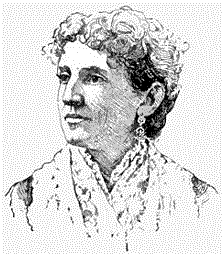|
 |

Part of the American
History & Genealogy Project |
Lillie Devereux Blake 1835 ~ 1913


Lillie Devereux Blake
Both the parents of Mrs. Lillie Devereux
Blake were descended from the Reverend Jonathan Edwards, D.D.,
so her inclination to reform might have been a matter of direct
inheritance. But the vehicle she used for her preaching was much
milder than the invectives of her distinguished ancestor. She
was born in Raleigh, North Carolina, August 12, 1835, but was
brought to New Haven, Connecticut, by her widowed mother that
she might have every advantage of education. She took the Yale
college course with tutors at home, and continued her studies
until after she was married in 1855 to Frank Q. Umsted. When in
1859 he died leaving her a widow with two children she had
already begun to write; one of her first stories, "A Lonely
House," having appeared in the Atlantic Monthly, A novel, "Southwold"
had also achieved its success. The large fortune she had
inherited was sadly impaired and it was necessary that the young
widow begin to work in earnest, writing stories, sketches and
letters for several leading periodicals. In 1862 she published a
second novel ''Rockford" and afterwards several romances. It was
not until 1869, after her second marriage to Grenfill Blake, a
young merchant of New York, that she became actively interested
in the women's suffrage movement. In 1872 she published a novel
called "Fettered for Life," designed to show the many
disadvantages under which women labor. In 1873, she made an
application for the opening of Columbia College to young women,
and as an argument she presented a class of qualified girl
students. The agitation then begun by Mrs. Blake eventually led
to the establishment of Barnard College.
In 1879 she was unanimously elected president of the New York
State Woman Suffrage Association, and she held that office for
eleven years. She has also lectured a great deal, but being a
woman of strong affection and marked domestic tastes, her
speaking out of New York has been done almost wholly in the
summer when her family was naturally scattered. Her lectures
printed under the title of "Woman's Place To-Day," had a large
sale. Among the many reforms in which she has been actively
interested has been that of securing matrons to take charge of
women detained in police stations. As early as 1871 Mrs. Blake
spoke and wrote on this subject but it was not until 1891 that
public sentiment was finally aroused to the point of passing a
law enforcing this much-needed reform.
The employment of women as census-takers was first urged in 1880
by Mrs. Blake. The bills giving seats to saleswomen, ordering
the presence of a woman physician in every insane asylum in
which women are detained and many other beneficent measures were
presented or aided by her. In 1886 Mrs. Blake was elected
president of the New York City Women's Suffrage League and
throughout this office she attended conventions and made
speeches in most of the states and territories besides
addressing committees of both houses of Congress and the New
York and Connecticut legislatures.
A graceful and logical writer, witty and eloquent as a speaker,
Mrs. Blake has proved herself a charming hostess, her weekly
receptions through the season in New York having been for many
years among the attractions of literary and reform circles.
Women of
America

Source: The Part Taken by Women in
American History, By Mrs. John A. Logan, Published by The Perry-Nalle
Publishing Company, Wilmington, Delaware, 1912.
|